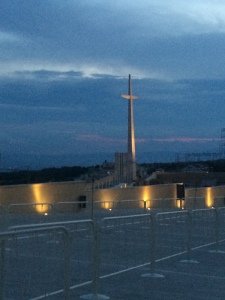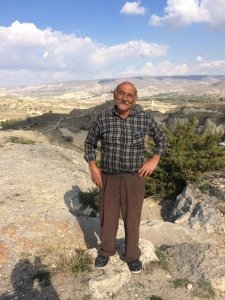Pioneering Our Way Back to Old Time Religion
Mystic Mondays September 26, 2016Twenty three years ago I stood before our presbytery in defense of my Statement of Faith. It's a historic tradition in the church to defend orthodoxy (that is, the beliefs that fit in the church's theological box). At its lowest point those who could not defend and promote orthodox beliefs were burned at the stake. Most often, however, it just meant excommunication from the community, which, in those days was often just a slow death sentence. Today, if a candidate for membership in a church body can't pass the orthodoxy test it just means that they find a church that better reflects their possibly unorthodox beliefs. These days there's a church for everybody! Twenty three years ago the orthodoxy police noticed something in my Statement of Faith that made them nervous. It was clear that when it came to the doctrine of the incarnation (that Jesus was fully human and fully divine) that I leaned heavily on the fully human side. I said, "Jesus was fully human and thus fully divine, manifested in his full commitment to compassion, healing, justice and peace."Some in the presbytery found it wonderfully refreshing as I discarded any references to Jesus divinity as somehow being above and separate from his humanity. But others were very nervous that I was driving my theological care right on the edge of a cliff called Arianism--an early heresy of the church that denied Jesus divinity and celebrated his humanity and his unique and intimate relationship with God. I took questions while shaking in my shoes knowing that my professional future was at stake. I wasn't going to be burned at the stake (it was raining outside anyway), but my livelihood was in jeopardy.In the end I found my way through, although at the time I felt that I had chickened out a bit. I told them that it wasn't that I didn't affirm the divinity of Jesus as much as I felt the need to get the pendulum to swing back more toward his humanity after centuries of highlighting his divinity at the cost of his humanity. Today my thinking on this is much more sophisticated and I wished that I could have defended my thesis with more depth than I did. At the same time I was glad that I had the intuitive sense to find a way to defend my nod to Jesus humanity while allaying the fears of those who were thinking that Arius had just been resurrected in their presence!
Twenty three years ago the orthodoxy police noticed something in my Statement of Faith that made them nervous. It was clear that when it came to the doctrine of the incarnation (that Jesus was fully human and fully divine) that I leaned heavily on the fully human side. I said, "Jesus was fully human and thus fully divine, manifested in his full commitment to compassion, healing, justice and peace."Some in the presbytery found it wonderfully refreshing as I discarded any references to Jesus divinity as somehow being above and separate from his humanity. But others were very nervous that I was driving my theological care right on the edge of a cliff called Arianism--an early heresy of the church that denied Jesus divinity and celebrated his humanity and his unique and intimate relationship with God. I took questions while shaking in my shoes knowing that my professional future was at stake. I wasn't going to be burned at the stake (it was raining outside anyway), but my livelihood was in jeopardy.In the end I found my way through, although at the time I felt that I had chickened out a bit. I told them that it wasn't that I didn't affirm the divinity of Jesus as much as I felt the need to get the pendulum to swing back more toward his humanity after centuries of highlighting his divinity at the cost of his humanity. Today my thinking on this is much more sophisticated and I wished that I could have defended my thesis with more depth than I did. At the same time I was glad that I had the intuitive sense to find a way to defend my nod to Jesus humanity while allaying the fears of those who were thinking that Arius had just been resurrected in their presence! I share this little vignette because these memories are coming back as I move more and more into this exploration of our ancient mystical traditions. Twenty three years ago I had no idea what I was doing or saying except that in my heart of hearts I knew that my understanding of Jesus divinity only came through my experience of his humanity. There was no divinity apart from his humanity. What made him divine (if we accept our creedal formulations) was his capacity to live fully into the human drama and predicament even at the cost of death on a cross. This stuff is not for sissies!This past week I had it confirmed again. I was facilitating the class on BBC's The History of Christianity by Diarmaid MacCulloch. We were reviewing the nearly 1000-year history of the Orthodox Christian Church that had split from the Roman Catholic Church in 1054 C.E. (Common Era). There is so much I can share about this, but the one thing that struck me was that Roman Catholicism (and later Protestantism) were largely shaped by the idea of original sin and the Orthodox Church was shaped by the idea of original blessing (a term coined by Matthew Fox, a former Catholic priest).The big difference is this. In the West we start with the idea that humanity is fallen and it takes a savior to redeem us to divine favor. We can become divine, but only through an intermediary who washes away our sins. In the East the assumption is that humanity and divinity are in a playful dance with each other and manifested in nature, art, music, drama and even humans themselves! Religion is not about redeeming us from sin, but about opening up the portals to see the divine within the created order. Heaven is not a far off hope, but a present reality right here on earth.
I share this little vignette because these memories are coming back as I move more and more into this exploration of our ancient mystical traditions. Twenty three years ago I had no idea what I was doing or saying except that in my heart of hearts I knew that my understanding of Jesus divinity only came through my experience of his humanity. There was no divinity apart from his humanity. What made him divine (if we accept our creedal formulations) was his capacity to live fully into the human drama and predicament even at the cost of death on a cross. This stuff is not for sissies!This past week I had it confirmed again. I was facilitating the class on BBC's The History of Christianity by Diarmaid MacCulloch. We were reviewing the nearly 1000-year history of the Orthodox Christian Church that had split from the Roman Catholic Church in 1054 C.E. (Common Era). There is so much I can share about this, but the one thing that struck me was that Roman Catholicism (and later Protestantism) were largely shaped by the idea of original sin and the Orthodox Church was shaped by the idea of original blessing (a term coined by Matthew Fox, a former Catholic priest).The big difference is this. In the West we start with the idea that humanity is fallen and it takes a savior to redeem us to divine favor. We can become divine, but only through an intermediary who washes away our sins. In the East the assumption is that humanity and divinity are in a playful dance with each other and manifested in nature, art, music, drama and even humans themselves! Religion is not about redeeming us from sin, but about opening up the portals to see the divine within the created order. Heaven is not a far off hope, but a present reality right here on earth. I am just struck by this intuitive journey that I have travelled that began many years ago. It first started with a paper on the "Death of God" where I agreed with those radical 60's theologians that the images we have used for God would likely need to die before the Church could be reformed again. That followed my Statement of Faith defenses where I had made a nod to the humanity of Jesus and found myself on the theological hot seat. I have teased these ideas out over the years in sermons, but it was when my soul cried out, "Go to Turkey, visit the land of Rumi" that my intuitive hunches started to find an historical basis. It's all starting to come together.I am suddenly thinking, "I need to take people to Istanbul and to Konya (Rumi's Tomb) and to Thessaloniki, Greece"--all places where this ancient mystical impulse is rooted in the people, the land, the traditions and the history.It's funny. We are often talk about the new spiritualities that are emerging in the West as if were discovering new worlds. I actually don't think they are new at all. In fact, they are old, really old. I am starting to believe that we aren't breaking new ground here at all. We may be just healing a 1000 year old split in our Christian family. We may be just coming home, finally coming home.
I am just struck by this intuitive journey that I have travelled that began many years ago. It first started with a paper on the "Death of God" where I agreed with those radical 60's theologians that the images we have used for God would likely need to die before the Church could be reformed again. That followed my Statement of Faith defenses where I had made a nod to the humanity of Jesus and found myself on the theological hot seat. I have teased these ideas out over the years in sermons, but it was when my soul cried out, "Go to Turkey, visit the land of Rumi" that my intuitive hunches started to find an historical basis. It's all starting to come together.I am suddenly thinking, "I need to take people to Istanbul and to Konya (Rumi's Tomb) and to Thessaloniki, Greece"--all places where this ancient mystical impulse is rooted in the people, the land, the traditions and the history.It's funny. We are often talk about the new spiritualities that are emerging in the West as if were discovering new worlds. I actually don't think they are new at all. In fact, they are old, really old. I am starting to believe that we aren't breaking new ground here at all. We may be just healing a 1000 year old split in our Christian family. We may be just coming home, finally coming home.
